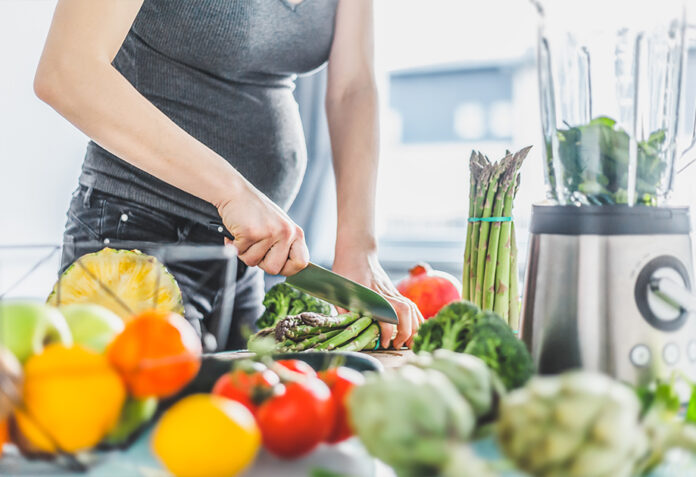Pregnancy is a unique and miraculous time in a woman’s life, as she nurtures and nourishes a growing life within her. A healthy diet is essential for promoting the well-being of both the mother and the unborn child in addition to the physical and psychological changes that occur during pregnancy. In this thorough guide, we’ll discuss the value of a balanced pregnancy diet and give you a tonne of mouthwatering, wholesome recipes to enjoy during this unique time.
Why Is Eating Well During Pregnancy Important?
A balanced, nutrient-rich diet is essential for both the mother’s general health and well-being during pregnancy as well as the healthy development of the fetus. A woman’s body goes through a lot of changes during pregnancy in order to support the growth and development of the unborn child. Due to these changes, the body now requires more nutrients, making it crucial to eat enough of the essential nutrients to support fetal growth, maternal health, and the postpartum production of breast milk.
The following justify how important it is to maintain a healthy diet while pregnant:
● Foetal Development: During pregnancy, the baby’s organs and tissues grow quickly, and a healthy diet is crucial for this development. The development of the fetal body, including the brain, bones, muscles, and immune system, depends on essential nutrients like folate, iron, calcium, protein, omega-3 fatty acids, and vitamin D.
● Maternal Health: The mother’s body can experience stress during pregnancy, and a healthy diet can support her overall health and well-being. Anemia, gestational diabetes, preeclampsia, and excessive weight gain are pregnancy-related problems that eating enough nutrients can help prevent or manage.
● Energy and Strength: Because pregnancy can be physically taxing, eating a healthy diet can give pregnant women the energy and stamina they need to adjust to their changing bodies and get ready for labor and delivery.
● Postpartum Recovery: By providing the mother’s body with the nutrients it needs to heal and produce breast milk after giving birth, a healthy diet during pregnancy can also aid in postpartum recovery.
● Long-term Health: Both the mother and the unborn child can benefit from a balanced diet during pregnancy in terms of long-term health. It can aid in the development of healthy eating practices, guard against chronic diseases later in life, and lay the groundwork for lifelong wellness.
Nutritional Needs During Pregnancy
A well-rounded diet during pregnancy should contain a variety of nutrient-dense foods. The following essential vitamins and minerals should be included in a healthy pregnancy diet:
● Folate: Folate, also referred to as folic acid, is a B vitamin that is essential for the growth of the fetal brain and spinal cord. Neural tube defects, which are serious birth defects that affect the baby’s brain and spinal cord, can be avoided with its aid. Leafy green vegetables, citrus fruits, legumes, fortified cereals, and supplements as advised by healthcare professionals are excellent sources of folate.
● Iron: Red blood cell production and the prevention of anemia during pregnancy both depend on iron. It is crucial for the growth and development of the fetus as well. Red meat, poultry, fish, beans, lentils, tofu, fortified cereals, and leafy green vegetables are all excellent sources of iron.
● Calcium: Both the mother and the fetus need calcium to develop strong bones and teeth. Additionally, it affects how nerves and muscles contract. Dairy products, fortified plant-based milk, leafy green vegetables, nuts, seeds, and fortified cereals are all excellent sources of calcium.
● Protein: Both the mother’s and the baby’s tissues need protein to grow and repair. In addition, it is necessary for the synthesis of hormones, antibodies, and enzymes. Meat, poultry, fish, eggs, dairy products, beans, lentils, tofu, nuts, seeds, and quinoa are all excellent sources of protein.
● Omega-3 Fatty Acids: Omega-3 fatty acids are necessary fats that are essential for the growth of the fetal brain and eyes. Salmon, sardines, and trout are good sources of omega-3 fatty acids, as are flaxseeds, chia seeds, walnuts, and eggs that have been fortified.
● Vitamin D: Vitamin D is essential for strong bones and a healthy immune system. Additionally, it facilitates the body’s absorption of calcium, which is necessary for fetal bone development. Sunlight, fortified dairy products, fortified plant-based milk, fatty fish, and supplements as advised by medical professionals are all excellent sources of vitamin D.
● Vitamin C: Vitamin C supports the body’s ability to absorb iron from plant-based foods and is crucial for the immune system. Citrus fruits, strawberries, kiwis, bell peppers, broccoli, and tomatoes are all excellent sources of vitamin C.
● Fiber: Fiber aids in the prevention of constipation, which is a common occurrence during pregnancy and is crucial for digestive health. Whole grains, fruits, vegetables, legumes, nuts, and seeds are excellent sources of fiber.
● Water: Staying hydrated is important during pregnancy because it supports kidney function, prevents constipation, and helps regulate body temperature. It also helps maintain a healthy blood volume. Aim for at least 8 to 10 cups of water per day for pregnant women, and more if they are physically active or it is hot outside.
Pregnancy Diet Advice
Healthy pregnancy diet maintenance doesn’t have to be difficult. Here are some useful pointers to assist you in choosing healthy foods while pregnant:
Nutrient-Rich Food: Aim to include a variety of nutrient-rich foods from all food groups in your diet by following a balanced diet. Fruits, vegetables, whole grains, lean proteins, dairy products, and dairy substitutes, as well as healthy fats, are all included. To ensure you’re getting a variety of nutrients, try to eat foods from all the colors of the rainbow.
Watch Your Portions: Although your energy requirements rise during pregnancy, this does not mean you should eat significantly more. Pay attention to your body’s hunger cues and place a focus on portion control. Aim for balanced meals and snacks throughout the day and refrain from overeating.
Choose Nutrient-Dense Meals: Pick meals that are high in healthy fats, whole grains, lean proteins, fruits, and vegetables, as well as other essential nutrients. Avoid empty calories from processed foods, sugary snacks, and beverages that have little nutritional value.
Eat consistently: To maintain steady blood sugar levels and prevent energy dips, try to eat consistently throughout the day for meals and snacks. Try to eat every three to four hours, and if you feel hungry in between meals, have a healthy snack.
Keep Hydrated: To stay hydrated, sip copious amounts of water throughout the day. Avoid excessive caffeine and sugary drinks because they can dehydrate the body. If you’re experiencing nausea, try drinking water flavored with ginger or lemon to soothe your stomach.
Take Prenatal Vitamins: Taking prenatal vitamins will help you meet your body’s increased nutrient requirements during pregnancy. Talk to your doctor about the best prenatal vitamin for you, then take it as directed.
Practice Food Safety: To lower the risk of foodborne illnesses, pay extra attention to food safety during pregnancy. Fish, meat, eggs, and unpasteurized dairy products should never be eaten raw or undercooked. To avoid food spoilage, wash your hands and food preparation surfaces frequently.
Limit Certain Foods: Due to possible risks to the unborn child, some foods should be consumed in moderation or not at all during pregnancy. These include foods high in mercury like shark, swordfish, king mackerel, and tilefish, seafood that is raw or undercooked, soft cheeses, deli meats, raw or undercooked eggs, and beverages with a lot of caffeine. Get a complete list of foods to stay away from during pregnancy by speaking with your healthcare provider.
In conclusion, it is critical for both the mother and the unborn child to maintain a healthy diet during pregnancy. A healthy, well-balanced diet can support the mother’s well-being, give the developing fetus the nutrients it needs, and help avoid complications during pregnancy. A personalized pregnancy diet plan that takes into account the unique requirements of the mother and the unborn child should be developed in consultation with a healthcare professional or a registered dietitian.
Pregnant women can be sure they are consuming the right nutrients for a healthy pregnancy by including a variety of foods from all food groups, such as fruits, vegetables, whole grains, lean proteins, healthy fats, and dairy or dairy substitutes. To reduce the risk of foodborne illnesses, it’s important to stay away from high-risk foods like raw or undercooked seafood, soft cheeses, deli meats, and excessive amounts of caffeine.




